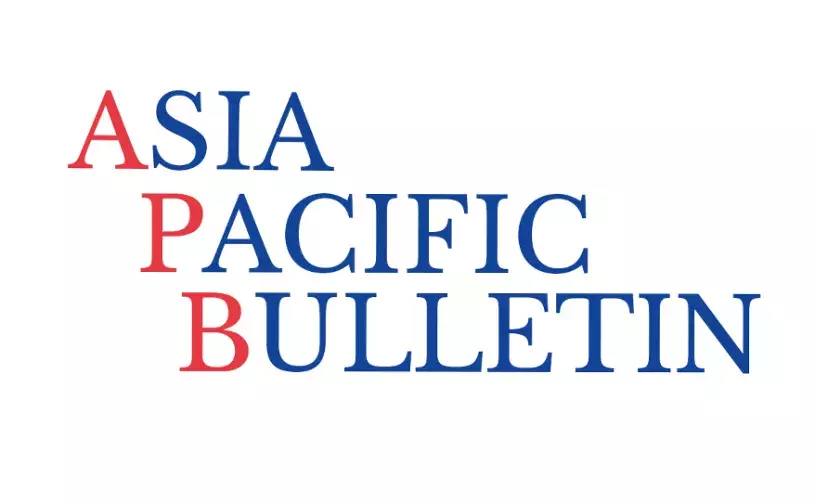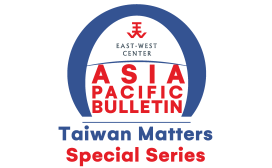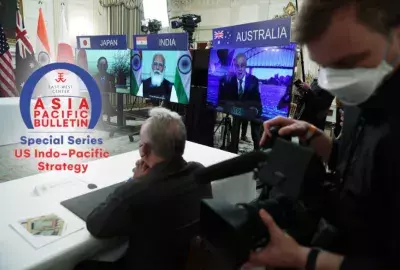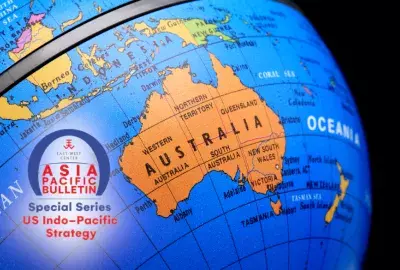Error message


|
David R. Stilwell, retired Air Force brigadier general and former assistant secretary of state for Asia and the Pacific, explains that as "Beijing’s endless promises to 'continue to reform and open China’s economy' ring increasingly hollow, the attractiveness of Taiwan as a tech leader, trade partner, and model for Rule of Law governance only increases." |
The forthcoming release of East West Center’s Taiwan Matters for America could not be better timed. Since 1979, Washington’s Taiwan policy has fluctuated based on various assessments of Beijing’s willingness to liberalize. After forty years of trying, a bipartisan consensus has emerged that acknowledges Beijing’s decision to go it alone. In the last two years the Chinese Communist Party (CCP) has walked away from the Sino-British Joint Declaration voiding its guarantee of Hong Kong’s political autonomy. It also covered up a pandemic instead of allowing a World Health Organization delegation to investigate and contain the outbreak as it agreed when it signed the International Health Regulations. All the while, the CCP continues to inflict authoritarian abuse on the Chinese people in violation of the Universal Declaration of Human Rights which it signed. Beijing has never allowed itself to be bound by any commitment that does not provide advantage.
As Beijing’s endless promises to “continue to reform and open China’s economy” ring increasingly hollow, the attractiveness of Taiwan as a tech leader, trade partner, and model for rule of law governance only increases. Taiwan is a democratic stalwart and cooperative partner with complementary capabilities that define “win-win cooperation.”
Over the last four decades US China policy has been guided by the prescient Taiwan Relations Act (TRA), which codifies the agreement with Beijing (Three Communiques) that Taiwan’s status will be decided through dialogue, without coercion or use of force. The TRA gives US administrations the latitude to work with Beijing to foster a peaceful resolution that accounts for the will of the Taiwanese people. The difficulty the CCP would have in transitioning to democratic governance or even living up to commitments was shrewdly accounted for within the TRA. However, it was not until Beijing violated its own “One China Two Systems” policy with the forced absorption of Hong Kong in 2020 that both Taiwan and the United States reluctantly concluded that no amount of engagement would change the path of the CCP.
In light of this reality, a network of like-minded democracies is coalescing to preserve Taiwan’s status. Japan has committed to defend Taiwan should Beijing resort to force. Australia has also stated it would be “inconceivable” that it would not come to Taiwan’s assistance in the case of aggression from the People’s Republic of China (PRC). It is difficult to overestimate the power of these like-minded assurances to Taipei, giving it the confidence needed to engage its larger authoritarian neighbor from a position of strength. Beijing calls this network of support for Taiwan “containment” and “provocation”; on the contrary, a strong Taiwan support network deters adventurism and ensures continued peace and stability in the region, which has benefitted everyone, especially China, for the last 70 years.
Whether as a model of liberal democracy, with its energetic and sometimes raucous Legislative Yuan, or as a world leader in tech research, development, and manufacturing, Taiwan has never mattered more than it does today. The existence of Taiwan puts paid to Beijing’s assertion that Chinese culture only works with authoritarian government, giving 1.4 billion mainland Chinese hope that someday their collective voice will determine China’s future, not an increasingly bellicose new-type authoritarianism.
As the security environment in China becomes less certain, opportunities for in-country language and culture study will decrease. Beijing’s unapologetic and inhumane imprisonment of two Canadian hostages in retaliation for Canada detaining a Huawei executive, starkly contrasts China’s rule by law approach with the rule of law ideal. This unfortunate turn of events makes linguistic and cultural immersion in the PRC less attractive. Taiwan provides an alternative for both in-country linguistic/cultural training, and a replacement for CCP-led Confucius Institutes in US schools.
As for trade and economic cooperation, even though Taiwan cannot match the PRC in quantity, the quality of the economic relationship offers great promise. Nothing demonstrates this better than the recent conclusion of an agreement with the Taiwan Semiconductor Manufacturing Company (TSMC) to build a world-class 5-nanometer chip foundry in Arizona. This development has provided the spark for other high-end manufacturers to return to American shores. Although we often hear talk of win-win outcomes from Beijing, the PRC’s onerous joint venture requirements and the difficulty in repatriating profits from China result in outcomes heavily weighted in China’s favor. No wonder American businesses are fleeing China. On the other hand, business operations in Taiwan benefit both sides equally. Taiwan is America’s 8th largest destination for agricultural products and its tech coordination is second to none.
The next step in solidifying the relationship with Taiwan would be a bilateral commitment to conclude a Free Trade Agreement. Taiwan, as a democratic nation that believes in transparent and accountable governance combined with rule of law dispute resolution, offers US companies numerous opportunities to expand commercial ties. Given the damage the CCP has done to the global economy with predatory trade policies and most recently with COVID-19 shutdowns and supply chain disruption, the logical response is to move American business to more reliable locations like Taiwan, Southeast Asia, and South Asia.
The robust and mutually beneficial US-Taiwan people-to-people, economic, and tech relationships, which Taiwan Matters for America seeks to detail, look better and better in light of Beijing’s empty promises to “reform and open,” despite increasingly desperate claims that it will someday do so. After all this time, the only conclusion one can reach is that the business environment in the PRC will only get more difficult, making it prudent for American companies to look for alternatives. Here Taiwan’s New Southern Policy merges with the increased attractiveness of doing business in South and Southeast Asia, providing another area of broad-spectrum cooperation with Taiwan. Taiwan Matters for America will highlight the importance of the bilateral relationship, the advantages of dealing with Democratic China, and further engagement with this essential like-minded partner.
As a country that honors its commitments, the United States will continue to support Taiwan in accordance with the Taiwan Relations Act and the Six Assurances. But the days of using Taiwan’s status as trade space for some grand bargain with Beijing are over. US-Taiwan policy honors our sacred commitment to the continued freedoms enjoyed by 24 million people for the last four decades. US-Taiwan ties are strong and recovering ground ceded to Beijing in the false hope that the PRC would liberalize. These connections underpin the US commitment to Taiwan and ensures that America will continue to stand with Taiwan well into the future.

|
David R. Stilwell, retired Air Force brigadier general and former assistant secretary of state for Asia and the Pacific, explains that as "Beijing’s endless promises to 'continue to reform and open China’s economy' ring increasingly hollow, the attractiveness of Taiwan as a tech leader, trade partner, and model for Rule of Law governance only increases." |
The forthcoming release of East West Center’s Taiwan Matters for America could not be better timed. Since 1979, Washington’s Taiwan policy has fluctuated based on various assessments of Beijing’s willingness to liberalize. After forty years of trying, a bipartisan consensus has emerged that acknowledges Beijing’s decision to go it alone. In the last two years the Chinese Communist Party (CCP) has walked away from the Sino-British Joint Declaration voiding its guarantee of Hong Kong’s political autonomy. It also covered up a pandemic instead of allowing a World Health Organization delegation to investigate and contain the outbreak as it agreed when it signed the International Health Regulations. All the while, the CCP continues to inflict authoritarian abuse on the Chinese people in violation of the Universal Declaration of Human Rights which it signed. Beijing has never allowed itself to be bound by any commitment that does not provide advantage.
As Beijing’s endless promises to “continue to reform and open China’s economy” ring increasingly hollow, the attractiveness of Taiwan as a tech leader, trade partner, and model for rule of law governance only increases. Taiwan is a democratic stalwart and cooperative partner with complementary capabilities that define “win-win cooperation.”
Over the last four decades US China policy has been guided by the prescient Taiwan Relations Act (TRA), which codifies the agreement with Beijing (Three Communiques) that Taiwan’s status will be decided through dialogue, without coercion or use of force. The TRA gives US administrations the latitude to work with Beijing to foster a peaceful resolution that accounts for the will of the Taiwanese people. The difficulty the CCP would have in transitioning to democratic governance or even living up to commitments was shrewdly accounted for within the TRA. However, it was not until Beijing violated its own “One China Two Systems” policy with the forced absorption of Hong Kong in 2020 that both Taiwan and the United States reluctantly concluded that no amount of engagement would change the path of the CCP.
In light of this reality, a network of like-minded democracies is coalescing to preserve Taiwan’s status. Japan has committed to defend Taiwan should Beijing resort to force. Australia has also stated it would be “inconceivable” that it would not come to Taiwan’s assistance in the case of aggression from the People’s Republic of China (PRC). It is difficult to overestimate the power of these like-minded assurances to Taipei, giving it the confidence needed to engage its larger authoritarian neighbor from a position of strength. Beijing calls this network of support for Taiwan “containment” and “provocation”; on the contrary, a strong Taiwan support network deters adventurism and ensures continued peace and stability in the region, which has benefitted everyone, especially China, for the last 70 years.
Whether as a model of liberal democracy, with its energetic and sometimes raucous Legislative Yuan, or as a world leader in tech research, development, and manufacturing, Taiwan has never mattered more than it does today. The existence of Taiwan puts paid to Beijing’s assertion that Chinese culture only works with authoritarian government, giving 1.4 billion mainland Chinese hope that someday their collective voice will determine China’s future, not an increasingly bellicose new-type authoritarianism.
As the security environment in China becomes less certain, opportunities for in-country language and culture study will decrease. Beijing’s unapologetic and inhumane imprisonment of two Canadian hostages in retaliation for Canada detaining a Huawei executive, starkly contrasts China’s rule by law approach with the rule of law ideal. This unfortunate turn of events makes linguistic and cultural immersion in the PRC less attractive. Taiwan provides an alternative for both in-country linguistic/cultural training, and a replacement for CCP-led Confucius Institutes in US schools.
As for trade and economic cooperation, even though Taiwan cannot match the PRC in quantity, the quality of the economic relationship offers great promise. Nothing demonstrates this better than the recent conclusion of an agreement with the Taiwan Semiconductor Manufacturing Company (TSMC) to build a world-class 5-nanometer chip foundry in Arizona. This development has provided the spark for other high-end manufacturers to return to American shores. Although we often hear talk of win-win outcomes from Beijing, the PRC’s onerous joint venture requirements and the difficulty in repatriating profits from China result in outcomes heavily weighted in China’s favor. No wonder American businesses are fleeing China. On the other hand, business operations in Taiwan benefit both sides equally. Taiwan is America’s 8th largest destination for agricultural products and its tech coordination is second to none.
The next step in solidifying the relationship with Taiwan would be a bilateral commitment to conclude a Free Trade Agreement. Taiwan, as a democratic nation that believes in transparent and accountable governance combined with rule of law dispute resolution, offers US companies numerous opportunities to expand commercial ties. Given the damage the CCP has done to the global economy with predatory trade policies and most recently with COVID-19 shutdowns and supply chain disruption, the logical response is to move American business to more reliable locations like Taiwan, Southeast Asia, and South Asia.
The robust and mutually beneficial US-Taiwan people-to-people, economic, and tech relationships, which Taiwan Matters for America seeks to detail, look better and better in light of Beijing’s empty promises to “reform and open,” despite increasingly desperate claims that it will someday do so. After all this time, the only conclusion one can reach is that the business environment in the PRC will only get more difficult, making it prudent for American companies to look for alternatives. Here Taiwan’s New Southern Policy merges with the increased attractiveness of doing business in South and Southeast Asia, providing another area of broad-spectrum cooperation with Taiwan. Taiwan Matters for America will highlight the importance of the bilateral relationship, the advantages of dealing with Democratic China, and further engagement with this essential like-minded partner.
As a country that honors its commitments, the United States will continue to support Taiwan in accordance with the Taiwan Relations Act and the Six Assurances. But the days of using Taiwan’s status as trade space for some grand bargain with Beijing are over. US-Taiwan policy honors our sacred commitment to the continued freedoms enjoyed by 24 million people for the last four decades. US-Taiwan ties are strong and recovering ground ceded to Beijing in the false hope that the PRC would liberalize. These connections underpin the US commitment to Taiwan and ensures that America will continue to stand with Taiwan well into the future.







